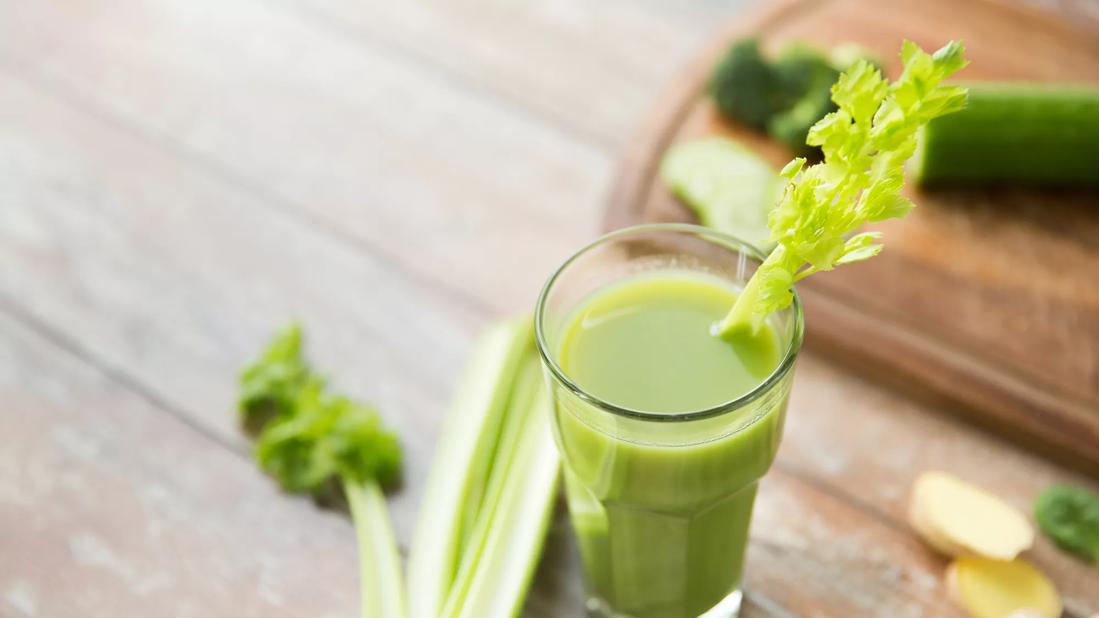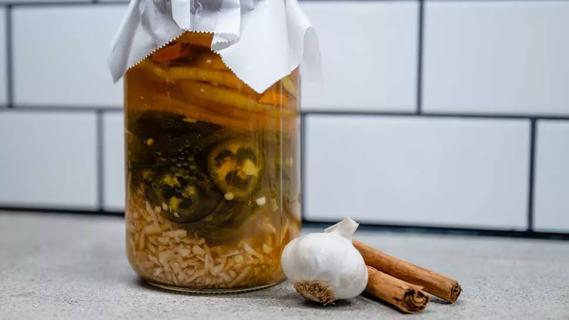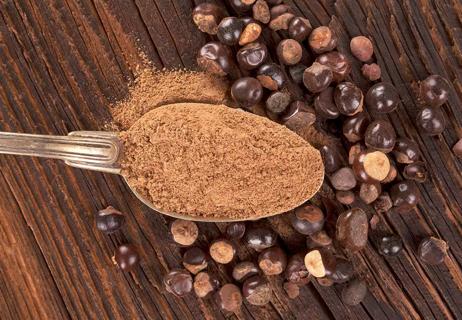While it isn’t bad for you, celery juice isn’t the detox phenom it’s claimed to be

On the surface, celery isn’t the flashiest of vegetables. It’s simple, hydrating and has a satisfying crunch. But does it have extra health benefits in juice form?
Advertisement
Cleveland Clinic is a non-profit academic medical center. Advertising on our site helps support our mission. We do not endorse non-Cleveland Clinic products or services. Policy
Like other juicing trends you may have heard of, celery juice has been celebrated across blogs and social media as a drink that can help rid your body of toxins. But while the humble green stalk does have its benefits, it’s not a miracle potion — and it’s not medicine.
Celery juice isn’t unhealthy, but it can’t reverse an unhealthy diet or fix all of your health issues in one gulp. Registered dietitian Amber Sommer, RD, LD, helps break down what to know about celery juice.
Don’t get us wrong — celery is awesome. It has tons of nutrients we need to help keep our bodies healthy. As long as you’re drinking pure celery juice and avoiding store-bought juices with extra additives and sugars, you’re still getting a lot of good.
Some health benefits of celery and celery juice include:
Whether you’ve dipped it in ranch or packed it in your kid’s lunchbox, celery is one of those simple, healthy greens that never go out of style. You may even be surprised how much nutritional value this simple veggie contains. And many of those benefits translate to juice form.
One 10-ounce serving of celery juice contains:
Advertisement
It’s also a good source of vitamins and minerals. That same serving of celery juice provides:
Celery contains certain substances like flavonoids, which help reduce inflammation in your body. Flavonoids act like shields, protecting your cells from damage caused by inflammation. Additionally, because celery is rich in vitamin C, it gives it antioxidant properties. Antioxidants help your body stay strong and fight off harmful substances.
Working celery into your diet (whether in juice or stalk form) may also benefit your heart health. Celery contains phthalides, a phytochemical that may help relax the muscles in the walls of your blood vessels and lower blood pressure.
But celery won’t do this all on its own — it’s just one vegetable after all. You should also work in other fruits, veggies and protein that’s part of the DASH diet for optimal heart health.
Drinking plenty of water is one of the best things you can do for your overall health. But some foods can help keep you hydrated as well, and celery is one of them. As celery is mostly water, you’re getting a boost of hydration even when you’re taking a snack break. In turn, this can help with your digestive system, kidneys and skin.
You may have also heard about the benefits of doing a celery juice cleanse. The idea behind this is to eliminate solid foods or specific types of food to help your body get rid of toxins.
What exactly does that entail? You basically drink a lot of juice. But Sommer warns against this tactic. The biggest concern about detox trends is that they’re often used as replacements for actual meals. Based on research, detox cleanses aren’t generally recommended by health professionals. A 2018 study also found that cleanses can lead to restrictive eating.
“Doing a juice cleanse for one day may not be all that harmful, however, I wouldn’t recommend juice cleansing for several days at a time,” she says. “Juice alone can’t provide you with the daily nutrients your body needs and can lead to undesirable side effects such as fatigue, dehydration, headaches, irritability and worse if done over an extended period of time.”
Sommer also adds that the healthiest way to consume celery juice is by drinking it as just that: juice, not a meal replacement.
“If anything, it could be a good supplement to an already balanced diet, where you know that you’re getting adequate protein, fiber, healthy fats and the calories that your body needs,” she continues.
Advertisement
The only downside of celery juice is that it may be taking away some of the goodness that’s in the stalk of celery. When juice is extracted from celery, it strips away much of the fiber, which is what helps you feel full, stabilizes your blood sugar and helps lower cholesterol, among other benefits. In juice form, everything else becomes concentrated — including the sugar.
“Celery alone has great nutritional benefits and is chock full of vitamins, minerals and antioxidants,” explains Sommer. “But having it just as a juice is eliminating fiber that your body needs to keep you feeling full and to support a healthy gut.”
Our bodies have a built-in detox machine: The liver. If you treat it right with healthy food, physical activity and a healthy body weight, it can do the heavy lifting in eliminating toxins from your body. Drinking juice won’t magically fix or enhance it.
While celery juice is still low in calories and sugar, in most commercially available products, it’s mixed with other kinds of juices to mask its bitter taste. This adds more calories and sugar. Sometimes, there are added vitamins and minerals thrown in for more “detox magic”! The problem is, there isn’t really any proof that those pricey juices do anything for your body.
Advertisement
Instead, Sommer recommends buying a whole celery stalk. Then, add it to a whole-food diet with fruits, vegetables, healthy fats, whole grains and lean proteins.
Celery juice has gained popularity for its potential health benefits, including hydration, nutrient richness and anti-inflammatory properties. Whether you like it for its refreshing taste or as part of a wellness routine, adding celery juice to your daily habits can help you reap the many benefits of celery.
But celery juice should be enjoyed only as part of a balanced diet. And, with any dietary change, consult a healthcare provider for more guidance.
Advertisement

Sign up for our Health Essentials emails for expert guidance on nutrition, fitness, sleep, skin care and more.
Learn more about our editorial process.
Advertisement

Options for sober social drinking are abundant, but be mindful about additives and triggers

Pickle juice has a reputation as a probiotic powerhouse, workout recovery aid, hangover cure and more

If you’re looking to boost your gut health, it’s better to get fiber from whole foods

Regularly drinking these sugar-fueled, stimulant-laden beverages can increase your risk of adverse health effects

This spicy concoction can do more harm than good, upsetting your stomach and causing painful acid reflux

Juicing removes beneficial fiber from fruits and veggies and raises your blood sugar

Sports drinks can give your body a boost, but it’s important not to overuse them

Guarana seeds may have benefits, but the potential is lost in processing

Even small moments of time outdoors can help reduce stress, boost mood and restore a sense of calm

A correct prescription helps your eyes see clearly — but as natural changes occur, you may need stronger or different eyeglasses

Both are medical emergencies, but they are very distinct events with different causes